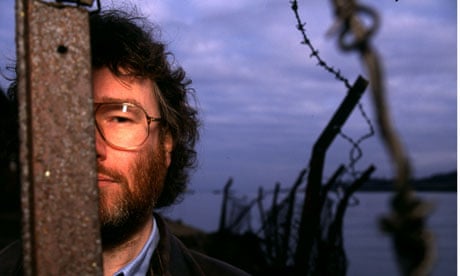30 years of Culture: what are the top five Iain M Banks novels?
These gritty space operas combine extravagant, high-tech invention with real human drama. Thirty years after they began appearing, here are some of the best

Our first image of Iain M Banks’s Culture universe is a man drowning in sewage: a stark precedent for what was to come. And 30 years after its first publication, Consider Phlebas remains a novel grimily opposed to the shiny rocketships and derring-do of most space opera. Banks broke the genre apart, and with a little inspiration from M John Harrison and Ursula Le Guin (and some outright theft from Larry Niven), he created a series of space opera novels that remains unmatched.
But for all his mastery of high-octane action sequences, and the sheer invention of his Big Dumb Objects, Banks’s science fiction – credited to M Banks, his fiction going without the middle initial – has lasted because his deft balance of galactic scope with human-scale stories. Stories of loss, grief, rebirth and self-discovery are the core of the best Culture novels. He did not write sci-fi and literary novels – he was a master of storytelling that combined both.
These are my top five Culture novels, but I wish have included at least five more. I’d put Use of Weapons at six, which might perplex fans of Banks at his most gung-ho. Seven would be short-story collection The State of the Art, which contains only brief glimpses of the Culture. Matter (eight), Inversions (nine) and Surface Detail (10) all have their own strengths, but lack the genius of Banks at his best – which I think you’ll find here:
Five: The Hydrogen Sonata
The final published Culture novel was a return to top form for Banks. The Gzilt are ready to “sublime” to the the next plane of existence. But first some old scores must be settled. It’s the most openly satirical of all Banks’s SF novels, offering an angry critique of “third-way” liberal leaders like Tony Blair. But the star of the show is the Mistake Not, a Culture ship of “non-standard” type IE packing lots of high-level weaponry. It shows exactly how tough the utopian Culture can be.
Four: Excession
Minds - sentient thinking computers - are the secret stars of the Culture novels, but here they take centre stage. What do virtually immortal, super intelligent AIs do for fun? Among other things they play out decades-long plots to topple less developed, more barbaric civilisations. But even Minds sometimes run up against opponents they can’t outwit. Featuring the Affront, a race literally named for how outrageously evil they are, this is Banks at his most playful, comedic and inventive.
Three: Consider Phlebas
After almost drowning the hero in sewage in it’s opening scene, the first published Culture novel goes on a rip roaring killing spree across the major sights of the Banksian universe. Space pirates, ringworlds, cannibal cultists, a lethal card game, and a Planet of the Dead... the Culture is shown through the eyes of those who hate and fear this machine lead society, creating by far the darkest of all Banks’s science fiction writing.
Two: The Player of Games
Both a love poem to the joy of game play, and a warning against the psychology of the game player, the story of the Culture’s best gameplayer, who is on a quest to compete against an alien society where games decide real world hierarchies, is the most complete and accessible book in the Culture series. This makes it a good starting point for the Iain M Banks neophyte, and also the first book I recommend to non-science fiction readers curious about the genre.
One: Look to Windward
I suspect that Look To Windward was Iain Banks showing off at the peak of his talents – and what a great show it is. The meddling Culture have accidentally set off a caste war in a civilisation they were trying to liberate. A young, high born officer, maimed in battle and broken by grief, is manipulated to commit a terrorist attack in revenge against the culture. Meanwhile, an exiled composer creates a symphony to mark the light of an ancient super-nova, seen at two points and six centuries apart, by the immortal Mind who blew the star up. The fact that half the cast are six limbed tiger-like predators somehow only adds to the poetry. Look to Windward is where Banks’s interleaving of science fiction imagery, and literary themes,reaches it’s own symphonic climax, making it not just the greatest Culture novel, but perhaps the greatest ever science fiction novel.
- What are your favourite Iain M Banks novels? Let us know in the comments below.

No comments:
Post a Comment